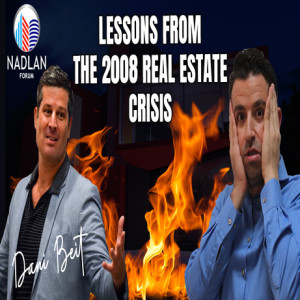
Saturday Jun 05, 2021
Lessons From the 2008 Real Estate Crisis - Entrepreneur of the Week - Post 3 - Dani Beit-Or
Lessons from the 2008 crisis
#EntrepreneuroftheWeek #Post3 Dani Beit-Or
First it should be emphasized that what was during the crisis of 2008 is not necessarily true these days. Caught in a crisis of a different kind that has never been seen before.
However, crises are always a period of learning, personal growth, learning lessons and an opportunity to improve the decision-making process for the future. A crisis is a kind of stress test and puts our investments and our strategy under a certain kind of load and shows us whether or not our economic decisions stand the load test.
Although I had a lot of conclusions from the 2008 crisis, both on a personal level, also on a business level, also in everything related to investments and more, I will focus on the main conclusions in terms of investments.
Maximum leverage
Assuming the purchase is made with a mortgage.
The mood in the United States before the 2008 crisis was that real estate did not stop rising, so the obvious conclusion is to buy as many properties as possible and in order to do so leverage as much personal capital as possible. This means mortgages with equity of 5% or 10% were very common at that time. The implication is that such low self-financing combined with such a high mortgage the assets will not generate a positive cash flow, meaning that the cash flow the asset produces will be negative, though not dramatically negative, between $ 100 and $ 400 negative cash flow per month per property.
If we take for example the asset that generates an average negative cash flow of $ 300 each month, or $ 3600 per year (before tax) but at the same time, this asset costs $ 15,000 a year in value, we can well understand the benefit of taking a negative cash flow. The problem is that as long as the investor can cover the negative cash flow from his personal income he will not have a problem.
When did a problem arise? Once the source of income used to inject the money into the property (such as a job, dismissals, etc.) is harmed. Maybe $ 300 a month doesn't sound like a lot of money but as long as there are one or two properties it might not be problematic. But if there are 20 or 30 such assets and at the same time the livelihood is harmed - then it directly affects the portfolio of assets.
Conclusion: Buy a smaller number of homes, put enough equity that each property generates a positive cash flow, and in fact the property is independent of its owner - that is, avoid a situation where the property owner has to inject money into the property on a monthly basis.
Note: Some readers read these lines and say to themselves "obviously, and how can it be that someone invests in such an irresponsible way" etc. But a few things need to be remembered. The first, was an optimistic mindset that led to such moves. Second, even today if you look at the conduct of real estate investors who have not gone through the recent crisis you see quite a bit of behavior of complacency and high self-confidence that leads to decisions that do not always take into account that there is a crisis on the horizon. An Israeli who started investing 10 years ago and experienced successes feels like he has cracked the method because for the past ten years he has enjoyed a strong back wind. In this spirit she was able to make up for various mistakes, glitches, and decisions. This means that it is very possible that the back wind offset 30 percent of the planned profit but still left with a nice profit.
Boring assets
The second conclusion was to invest in the most boring assets possible. And work according to a formula that adheres to the identification of these assets. In my world, boring properties are characterized by the following: BTC (detached house) in a suburb of a large metro, ie a metro of over a million and a half people, a metro with the presence of not only many large employers but also businesses representing different and diverse industries, With good schools and sought-after areas, in countries where the laws favor the property owner rather than the tenant and in countries that show strong positive immigration.
-------------------------------------------------------
YouTube Channel:
You can contact us on the site - we have more then 10,000 articles in 12 languages:
Or join the Facebook group -
Hebrew:
English:
And get weekly educational updates about the USA Real Estate market:
Contact Us At:
Phone: 978-600-8229
Email: Support@ForumRealEstateUSA.com
Version: 20241125
Comments (0)
To leave or reply to comments, please download free Podbean or
No Comments
To leave or reply to comments,
please download free Podbean App.